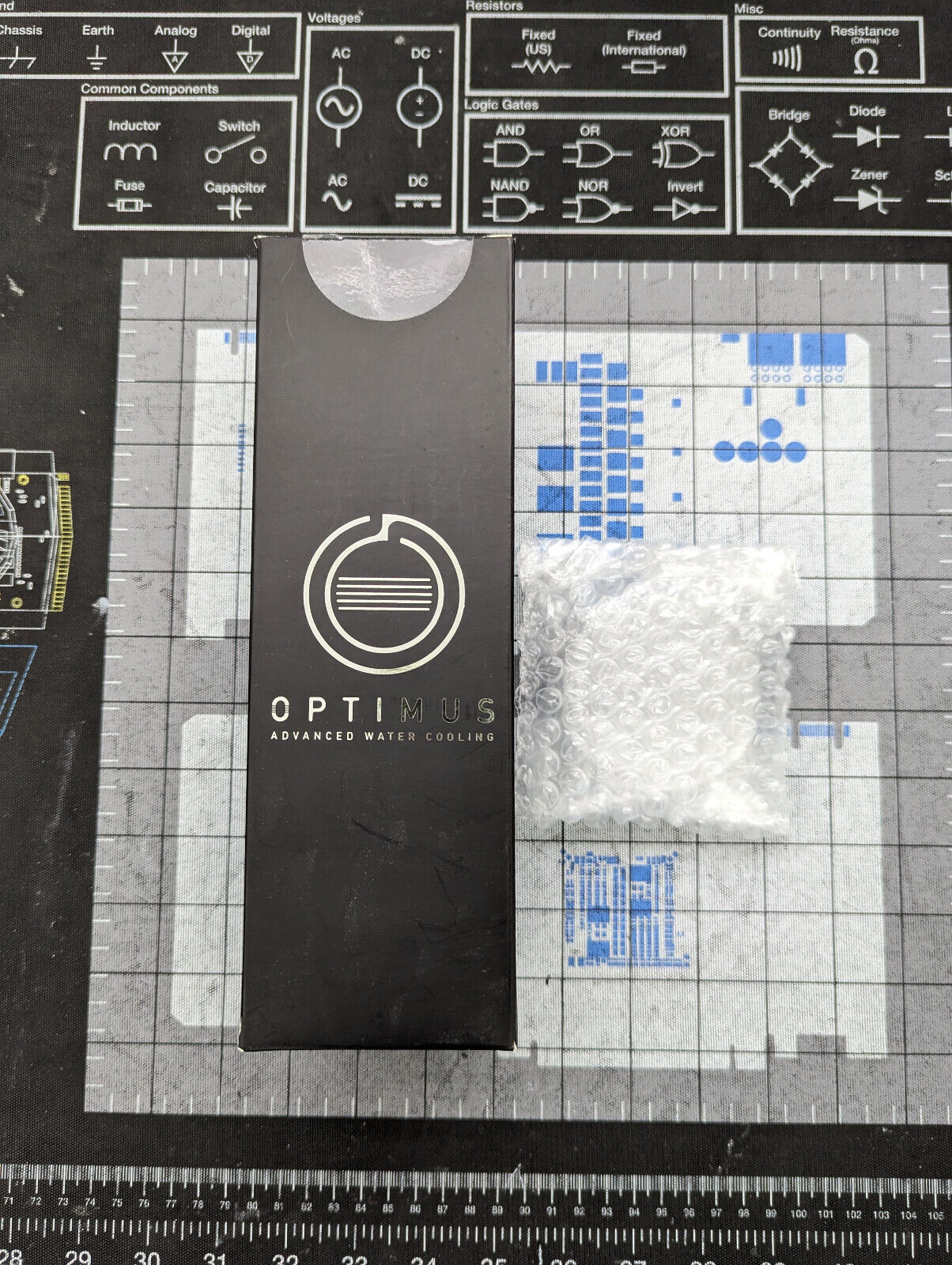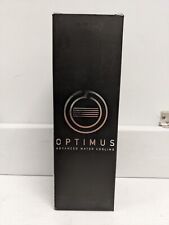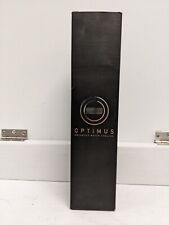Optimus Absolute Reservoir Silver 8.5\" Tube Three (3) Port Top plus extra Cap For Sale

When you click on links to various merchants on this site and make a purchase, this can result in this site earning a commission. Affiliate programs and affiliations include, but are not limited to, the eBay Partner Network.
Optimus Absolute Reservoir Silver 8.5\" Tube Three (3) Port Top plus extra Cap:
$138.00
Used. I then sent it back to Optimus to help me reseal and leak test. See pictures. Ready to Use. Comes with Extra Cap with no ports. No pump. Absolute D5 Reservoir System
The Optimus D5 Reservoir system is the new benchmark for PC liquid cooling reservoirs. Using only ultra strong cast acrylic, extra-thick reservoir walls, CNC polishing, unibody heat sinks and zero acrylic screw threads, the Optimus D5 Reservoir is the highest quality and most reliable D5 pump/res combo on the market.
THE RESERVOIR REINVENTEDWhen designing the Optimus D5 reservoir system, we started with a clean sheet of paper. Our goal was to create the most reliable, high performance pump/res system on the market. By using only cast acrylic and ultra-precision CNC methods, we succeeded in banishing the potential for acrylic cracks. And with the heat-wicking D5 heat sink and monolithic aluminum mounting system, the Optimus reservoir not only performs amazingly well, but is extremely compact, at only 3\" (75mm) square. And that\'s with the biggest and thickest reservoir tube (2.75\", 70mm) on the market.
FEATURING
Optimus uses only genuine Plexiglas® and Polycast™ brand cast acrylic. Unlike extruded, cast acrylics offers extreme crack resistance and incredible resistance to liquids, temperatures and chemicals. That\'s why cast acrylic is the only choice for everything from airplane windshields to the world\'s largest public aquariums.
THE ULTIMATE ACRYLIC RESERVOIRTHE THICKEST ACRYLIC RESERVOIR AVAILABLE
With 2.75” (70mm) outside diameter, 2.5” (63mm) inner diameter and ¼” (6.4mm) wall thickness, the Optimus reservoir is the thickest reservoir tube on the market.Most reservoirs are 60mm diameter with wall thickness 5mm or less. Not only does the thicker reservoir looks great, but it eliminates the issues of thin wall extruded reservoirs that are prone to cracking.
ELIMINATING CRACKED ACRYLIC RESERVOIRSOptimus uses only cast acrylic tubes from premium name-brand suppliers like Plexiglas® by Arkema and Polycast™ by Spartech. Cast acrylic tubing is one of the most difficult types of acrylic to make, but the quality is second to none.
The benefits of cast aren\'t small: extremely fracture resistant, highly stain resistant and excellent optical clarity.In fact, our cast acrylic is much stronger than acetal and nearly impossible to break. Feel free to allen wrench your fittings in place, our block won\'t blink.
CAST VS EXTRUDED ACRYLIC TUBE
Unlike cast, extruded acrylic tubing can be extremely cheap to purchase and it\'s easy to manufacture. That’s why extruded is used by nearly every watercooling company.But extruded acrylic isn\'t suited for liquid cooling parts. Extruded is prone to stress and spider web fractures from machining and expanding/contracting during temp fluctuations.
CAST VS INJECTION MOLDED NYLON TUBE
Like extruded acrylic, injection molded nylon feature similar downsides, including a +/- 10% expansion variation and high fluid retention, all sources of stress. Injection molding requires self-tapping screws, rather than CNCed threads, meaning the accuracy and service life of nylon is very low.
CAST VS BOROSILICATE GLASS TUBE
Borosilicate glass, while it looks great, has its own challenges. Glass can\'t be machined, thus requiring additional support to create the seal, opening a new host of potential leak issues. While borosilicate glass is much cheaper than cast acrylic, cast offers incredible durability and reliability while matching the clarity of glass.
DIAMOND VS FLAME POLISHEDOptimus uses only custom designed diamond CNC bits to achieve high optical quality while eliminating stress and chemical fractures, rather than buffing or flame polishing.
Flame polishing causes numerous problems. First, flaming (and vapor) polishing works by melting the outer layer of material to achieve a glass-like appearance. While the results look great, melting causes significant damage to the acrylic structure and makes the acrylic highly prone to stress cracking as well as spider webbing from fluids and temp fluctuations. Isopropyl alcohol will instantly destroy a flamed reservoir and not a CNC cast reservoir. Moreover, flamed acrylic has a tendency to turn yellow over time.
Additionally, by diamond polishing, we\'re able to achieve higher clarity in places flaming cannot, like the inside of ports and channels. While this is a far more time consuming and challenging process, we believe the results speak for themselves.
100% CNC MILLED ports AND RESERVOIRSA small but critical detail is we only CNC our G1/4” ports, never thread tap. Thread tapping is the industry standard because it’s easy and any budget drill press can do it. Thread tapping works by twisting a threaded drill bit into the material, causing burrs and extreme levels of stress. The resulting thread tapping micro fractures are nearly invisible, until the acrylic meets water, heat and pressure. Then micro turns into macro and cracks appear.
With CNCing (aka thread milling), specialized CNC bits are used to sculpt away the material and make the threads. CNC milling is vastly more accurate and causes far less pressure on the material, but takes much more time and requires high-speed CNC machines. For Optimus, CNC threads are a must.
Ultimately, all these steps combined make our acrylic reservoirs nearly indestructible.
TEMPERATURE REDUCING D5 PUMP HEAT SINKOur CNC aluminum d5 housing does double duty as a large heat sink to dissipate heat from the D5 pump. Now, you probably know that D5 pumps are cooled by the liquid in the impeller. This means the pump heat enters the liquid loop. And since D5s can pull up to 30 watts, the heat generated is not trivial.
With the Optimus heat sink, additional heat is pulled from the D5 and wicked into the air, not the liquid, reducing reservoir temps by a noticeable amounts.Overall, the Optimus system is multiple degrees cooler than any other pump/res combo on the market.
BRACKET-FREE MOUNTINGThe heat sink also acts as a massive monolithic case mounting assembly. Typically, pumps are mounted to cases with stamped metal brackets or rubber tire-style pump holders. By including the mounting in the metal base, not only is the mounting incredibly strong, but you can achieve a completely screw-free look in your PC builds.
The bottom brackets are perfect for many cases with pump adapters like the popular Lian Li PC-O11 cases. The back mounting holes are designed for cases with slots like NZXT and others. While there are no pump mounting standards in PCs, these patterns should give you plenty of options.
ONLY METAL-TO-METAL ASSEMBLYThe Optimus reservoir is assembled with stainless steel screws into only 6061-T6 metal threads, never acrylic or acetal threads. Plastic threads strip, crack and leak.Combined with weaker extruded acrylic and poorly thread-milled threads, cracks are all too common. While plastic threading is more affordable and the #1 pump style on the market, the life of an acrylic reservoir is very low.
Additionally, the monolithic pump housing provides a better D5 pump seal than acrylic threads or large screw-style D5 mounts. Both styles use plastic-to-metal that makes cross-threading (and thus stripping) far too easy. By using a metal-to-metal design, not only is the seal stronger, but the Optimus system is extremely crack resistant and can be disassembled and reassembled many times without the fear of stripping threads.
MACHINED VORTEX BREAKERThe vortex breaker deserves an upgrade. The breaker (aka anti-cyclone) prevents a whirlpool effect in your reservoir that can suck air bubbles into your loop. Rather than plastic or sponge breakers, the full metal breaker won\'t snap, disintegrate or catch air bubbles. The vortex breaker is machined C110 copper and Optimus-made brass screws, both with Pro-XE nickel plating. The breaker is blank on one side and can be reversed if you want that zero branding look.
SYMMETRICAL PORTSThe Optimus reservoir pump top feature symmetrical in and out ports, unlike most D5 reservoirs. Symmetrical ports allow cleaner looks for premium builds. Through extensive testing, we were able to create a spiral channel inside the pump top to make the D5 flow rate extremely high and efficient.
Additionally, the pump top can be rotated in any direction. So the bottom heatsink can be mounted to the back while the ports can face in the direction you need.
CLEANEST CABLE ROUTINGThe pump heat sink is designed for super clean cable routing. When mounted directly on the back wall of the chassis, the pump cables can go directly into the back cabling area for a true zero cable look. For cases with pump mounts, the cables can be run through the bottom, making the cables invisible from every angle.
LEADING SILENCEWith premium construction comes premium noise dampening. Reducing noise requires reducing both transmission and vibration. Because the pump is enclosed in a solid CNCed aluminum block, far less noise can escape. Moreover, the monolithic block mounting prevents vibrations from rattling the surrounding case. This way, we can eliminate the typical vibration-dampening rubber tires typically used to dampen D5 pumps

Related Items:
Optimus Absolute Reservoir - Silver Ceramic - Acrylic - 8.5" - No Port Preowned
$279.99
Optimus Absolute Reservoir Silver 8.5" Tube Three (3) Port Top plus extra Cap
$138.00
Optimus Absolute Reservoir - Black Ceramic - Acrylic - 12" - 3 Port - Preowned
$289.99
![]()
Documentation
- AIX Local Security Checks
- Backdoors
- CentOS Local Security Checks
- CGI abuses
- CISCO
- Databases
- Debian Local Security Checks
- Default Unix Accounts
- Denial of Service
- Fedora Local Security Checks
- Finger abuses
- Firewalls
- FreeBSD Local Security Checks


